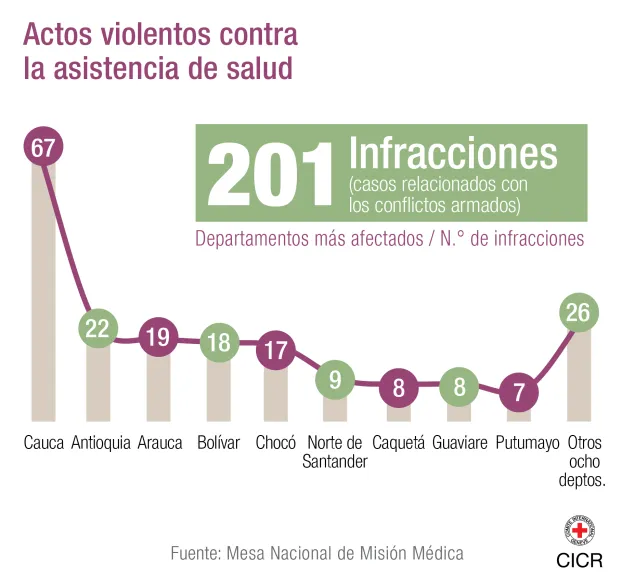Health care: another casualty of the armed conflict - Colombia

In 2024, another of the humanitarian consequences that intensified was violence against health-care workers. The National Medical Mission Board recorded 201 infractions (events related to the armed conflict). These included particularly serious events, such as the homicide of five people.
They also included threats; communities having their access to health services restricted or cut off entirely; health workers being forced to provide care in inadequate conditions; the theft of medicines and equipment; and actions to hinder care for wounded and sick people. It's likely that more infractions occurred than were recorded. Victims of these events do not always report them, due, among other reasons, to fear of reprisals from those perpetrating the violence.
These events were spread over 19 departments of the country, with Cauca, Antioquia, Arauca, Bolívar and Chocó the most affected, accounting for 71 per cent of the cases. The violence not only impacted the lives and safety of health-care workers, including traditional healers, but also affected their mental health. In 2024, we provided psychological and psychosocial support to 451
health-care workers with a range of conditions, including high levels of anxiety, stress and suffering, and difficulties carrying out their work and caring for others.

Health-care workers in the territories most affected by the armed conflicts face a triple threat: they are direct victims of violence, they work in highly dangerous environments and they are continuously exposed to the suffering of their patients. They also report that they lack trust in the local and national support system, live in constant fear of being attacked, feel hopelessness about their work and experience low self-esteem due to stigmatization, all of which leads many of them to resign from their positions.
This situation has serious repercussions for communities, as it creates obstacles to accessing health services. At times, thousands of people have been unable to access health care, with fatal consequences in some cases.



